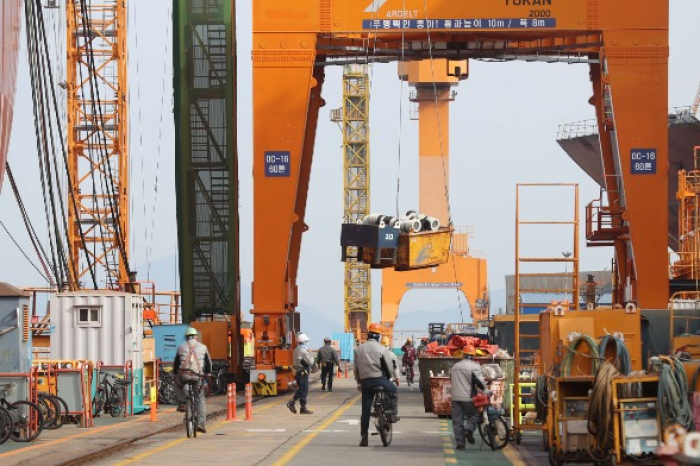Shipping & Shipbuilding
S.Korea to widen tech gap with global shipbuilding rivals
The country aims to run liquefied hydrogen carriers from 2029 and take 75% of the global high-value-added vessel market by 2030
By Oct 20, 2022 (Gmt+09:00)
2
Min read
Most Read
LG Chem to sell water filter business to Glenwood PE for $692 million


Kyobo Life poised to buy Japan’s SBI Group-owned savings bank


KT&G eyes overseas M&A after rejecting activist fund's offer


StockX in merger talks with Naver’s online reseller Kream


Mirae Asset to be named Korea Post’s core real estate fund operator



South Korea, the world’s largest shipbuilding country, will expand its production of high-value-added specialized vessels, such as liquefied hydrogen carriers, and autonomous ships to gain a competitive edge in the global shipbuilding market.
The Ministry of Trade, Industry and Energy announced on Oct. 19 a set of strategic plans to widen the Korean shipbuilding industry’s tech gap with global rivals.
The goal of the plans is to boost Korean ships’ global high-value added vessel market share from the current 60% to 75% by 2030, as well as to accelerate its commercialization of carbon-neutral ships.
It is also aiming to build a pilot liquefied hydrogen carrier from 2024 to 2029 and run the ship from 2029. Japan's Suiso Frontier is the world's first liquefied hydrogen carrier, which completed its first test cargo delivery in February of this year.
The ministry also pledged to support the development of autonomous ship technology to adhere to International Maritime Organization (IMO) Tier III standards to improve air quality and control emissions from ships, as well as arrange laws for the commercialization of the technology and operations by 2026.
Also, the government will support the mid-sized firms to accelerate their exports by conducting parts design, development and performance verification simultaneously.
In addition, it will support new business areas such as the improvement of floating storage regasification units (FSRUs), floating liquefied natural gas (LNG) import terminals capable of transporting, storing and regasifying LNG onboard, and the maintenance, repair and overhaul (MRO) of special vessels.
The ministry also said it will expand the fostering of high-tech personnel for the shipbuilding industry.
Korean shipbuilders received orders of 17.46 million compensated gross tonnage (CGT) last year, their highest annual performance after 18.52 million CGT in 2013.
However, the domestic shipbuilding industry is suffering from years of labor shortages due to a declining labor pool. Also, it is unclear whether Korea will maintain the world’s top shipbuilding spot as China is rapidly advancing high-value-added ship production and Europe and Japan are speeding up their autonomous and carbon-free ship development.
Write to So-Hyeon Kim at alpha@hankyung.com
Jihyun Kim edited this article.
More to Read
-
 Shipping & ShipbuildingKorean shipbuilders regain top post, to profit from higher ship prices
Shipping & ShipbuildingKorean shipbuilders regain top post, to profit from higher ship pricesOct 09, 2022 (Gmt+09:00)
3 Min read -
 Shipping & ShipbuildingKSOE in $1.5 billion shipbuilding deals with Maersk, Excelerate Energy
Shipping & ShipbuildingKSOE in $1.5 billion shipbuilding deals with Maersk, Excelerate EnergyOct 05, 2022 (Gmt+09:00)
2 Min read -
 Mergers & AcquisitionsHanwha agrees to buy Daewoo Shipbuilding for $1.4 billion
Mergers & AcquisitionsHanwha agrees to buy Daewoo Shipbuilding for $1.4 billionSep 26, 2022 (Gmt+09:00)
3 Min read -
 Shipping & ShipbuildingKorean shipbuilders yield No.1 spot to Chinese rivals
Shipping & ShipbuildingKorean shipbuilders yield No.1 spot to Chinese rivalsSep 06, 2022 (Gmt+09:00)
2 Min read -
 Mergers & AcquisitionsPrivate equity firms buys shipbuilder Daehan for $150 mn
Mergers & AcquisitionsPrivate equity firms buys shipbuilder Daehan for $150 mnSep 01, 2022 (Gmt+09:00)
2 Min read
Comment 0
LOG IN


